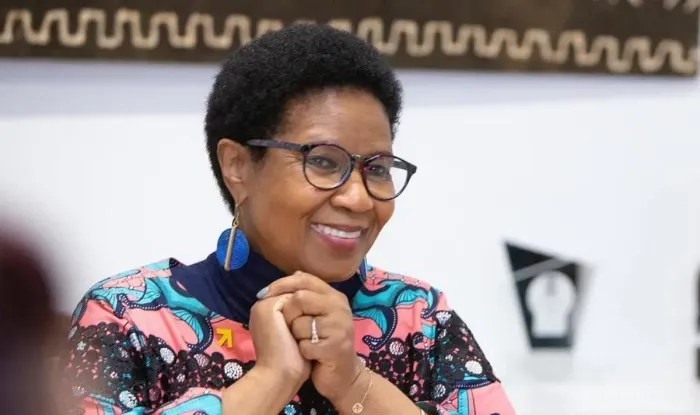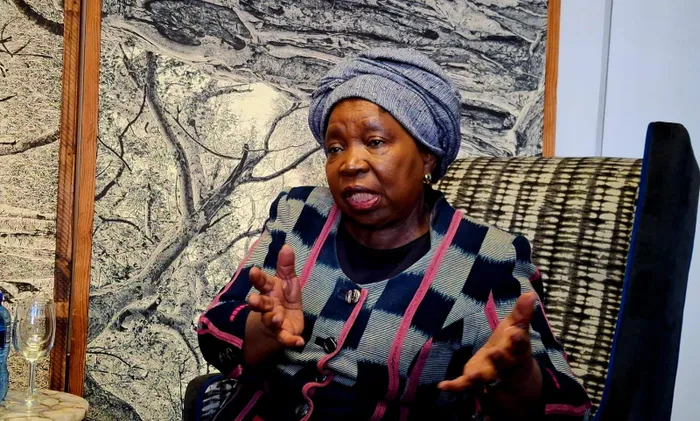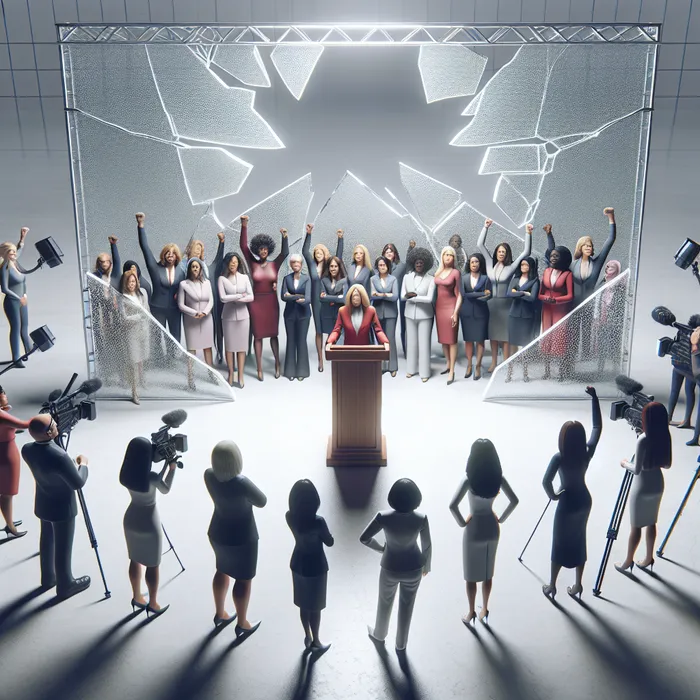Women's Day: Why South Africa has yet to elect its first woman president?

Phumzile Mlambo-Ngcuka worked as the executive director of the UN Women for eight years.
Image: Women Deliver / Facebook / File
South Africa is not short on capable women who could be candidates for the presidency — what’s holding the country back is fear and outdated thinking.
That’s according to several experts and political leaders who say the absence of a woman president has less to do with ability or lack of choice, and more to do with persistent gender bias and entrenched patriarchal attitudes within society and political structures.
Earlier this year, Ndemupelila Netumbo Nandi-Ndaitwah was the first woman elected as Namibia’s president on March 21, 2025. They followed Liberia's Ellen Johnson Sirleaf, who was the first woman elected to office on the continent.
The other female in charge at the moment is President Samia Suluhu Hassan from Tanzania, who took up the role after her predecessor died in 2021.
Just this week, while discussing Women’s Month, ANC veteran Dr Nkosazana Dlamini-Zuma, who is also the former chairperson of the African Union Commission, highlighted how women continue to bear a disproportionate burden of poverty, and that there should be equal opportunities between women and men.
Dlamini-Zuma stated that South Africa has developed into a patriarchal society where men predominantly hold power in political leadership, moral authority, social privilege, and property control.

ANC veteran and National Executive Committee (NEC) member Nkosazana Dlamini-Zuma at the Independent Media offices on Tuesday.
Image: Timothy Bernard / Independent Newspapers
Dlamini-Zuma contested to become the ANC president in 2017. However, she lost the battle to businessman-turned-politician Cyril Ramaphosa, who won 2,440 votes against her 2,261 votes during the ANC elective conference in Nasrec, Johannesburg.
“There is no reason why we shouldn’t have a woman president. We have seen that Liberia did well when a woman was in charge. In Namibia, it is still early, but we can see that she is doing well and the decisions she is taking are very decisive and Pan-Africanist. I like her decisions and I think she will do well for Namibia,” said Dlamini-Zuma.
Dlamini-Zuma said the pay gap between men and women needs to be addressed. She added that while the government has resolved the issue, this persists in the private sector, despite research showing that companies with more women in management are more competitive than those without female leaders.
Zululand University-based political analyst, Professor Sipho Seepe, agrees with Dlamini-Zuma's analysis: “Patriarchy is a thought system that afflicts both men and women in the same way that white supremacy afflicts black people. Black people suffering from the virus of white supremacy believe in their inferiority.
“They look up to whites for solutions to their problems, including those created by whites. In the same way, women would rather vote for the most mediocre and spineless man than support a highly qualified, disciplined, and experienced black woman. This script has replayed itself many times in our country and elsewhere.”
Postdoctoral Fellow to the H.F. Oppenheimer Chair of Human Rights, Dr Anisa Mahmoudi, weighed in and said that the primary obstacle to women in leadership is not readiness, but the deeply entrenched social norms influencing how society views women.
“South Africa, and much of the rest of the world, still overlooks the influence that existing patriarchal structures have on the advancement of women, positioning women as secondary to men in all spheres of societal functioning, especially political and other public-facing participation.
“Traditional concepts of authority and leadership remain gendered, and political participation is no exception. The status quo will remain until we address the deeply entrenched social norms that feed harmful narratives about the value, worth, and place of women in society,” Mahmoudi said.
Political analyst Nkosikhulule Nyembezi said that, similarly in other democracies, the process of choosing representatives is governed primarily by two sets of organisational and institutional rules - candidate selection methods framed by party rules and the state’s electoral laws.
“Because an electoral system is the vehicle through which to stand for public office and proceed to gain membership of a legislative body, South Africa is embarking on a critical electoral reform journey that could improve chances for females aspiring to the presidency.
“After 30 years of democracy in South Africa, the making of political choices must produce more election results that are less restricted by narrow political party trappings of citizens aspiring to be in legislative bodies and the executive,” Nyembezi said.
“We are ready for a female president because over the past decades, in several provinces and municipalities, we were well served by female premiers and mayors. Their individual and collective records of achievements confirm that we are all better people today, and ready for a female president.”
Distinguished professor in the Political Science department at Stellenbosch University, Amanda Gouws, said male domination in parties is hampering women, but also contributing to this problem is the ANC Women’s League, which said in the past that “SA is not ready for a woman President”.
“There was a woman deputy president under president Thabo Mbeki - Phumzile Mlambo-Ngcuka. She would have been excellent, but Mbeki was recalled. She became the director of UN Women.
“The issue is that men do not mentor women to become the next president, and the ANC also does little to mentor men; additionally, there are too many factions within the ANC,” Gouws said.
“Women are hampered by faction infighting. Other parties do not have enough support to form a government and to decide on a president.”
Patricia de Lille, minister of Tourism and the leader of the GOOD Party, said that one of the biggest obstacles is that too few women are supported to lead political parties.
“The ballot paper is still dominated by male faces. The irony is that 55% of registered voters in South Africa are women. Women are deeply embedded in the social and political fabric of this country. They participate. They vote. However, when it comes to leadership, that support doesn’t always translate.
“Over 30 years into democracy, and I’m still the only female party leader in Parliament. Over the years, we’ve only seen a handful of women at the helm of political organisations. We must change that. We need to go back to the drawing board and create pathways for more women to lead,” De Lille said.

Minister of Tourism, and GOOD Party leader, Patricia de Lille.
Image: Department of Tourism
Mahmoudi explained that women leaders face heightened scrutiny, reflecting the patriarchal norms.
“Generally speaking, women in the public sphere are judged by their 'likeability' rather than the substantive value they bring forward. Society still expects women to prove themselves, but using different yardsticks than men. This creates an unequal playing field.
“I would argue that people place different standards on women, for instance, questioning women’s toughness while critiquing them for being too assertive. This double standard extends to other areas as well,” Mahmoudi said.
“Women leaders are expected to demonstrate unwavering dedication and availability, yet face criticism for perceived neglect of family responsibilities, an expectation rarely placed on men leaders. Similarly, women’s confidence and authority are often perceived as arrogance and attempts at gaining power. Where men display similar characteristics, they are praised for them. The double standards place obstacles to women’s leadership and reflect the deeply embedded gendered assumptions that remain in South Africa and beyond.”

South Africa is not short on capable women who could be candidates for the presidency — what’s holding the country back is fear and outdated thinking.
Image: IOL / Ron AI
Ultimately, the experts agreed that it is the perception that needs to change.
“Women don’t need empowerment, they need opportunity and recognition. Women are already empowered. It is the system that holds them back. The language of empowerment suggests that women lack something inherent that needs to be given to them by others, usually men.
“The reality is that women are systematically excluded from pathways to leadership. What women need is an equal playing field,” Mahmoudi said.
Nyembezi said that South Africans must acknowledge the expressive value in the candidacy of female citizens.
Gouws added: “Women have skills. It is the way we appoint presidents that needs to change.”
De Lille added that we must change how we define leadership.
“It’s not about loud voices or power plays, it’s about ethical action and delivery. We need to build leadership pipelines, invest in women from the grassroots up, and ensure that political parties are spaces of empowerment, not exclusion.”
theolin.tembo@inl.co.za
Related Topics: